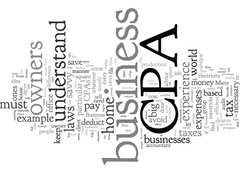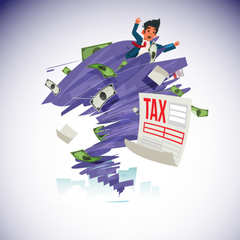
Despite the changing economy, real estate remains one of the most reliable ways to build wealth. The downside to that is, the more wealth you build, the more taxes you usually have to pay. For many, finding legal ways to lower taxes is an ongoing hunt. Surprisingly, the government has actually given active real estate investors a very simple—and legal—way to defer capital gains tax on real estate transactions. Yet many seasoned investors don’t use it. Why not? For the most part, it may be because a lot of people aren’t aware of it.
What is the 1031 Exchange Tax Deferral?
Read More

If your business has clients that are likely to want to pay with crypto, should you allow it? Since cryptocurrency first hit the currency market, it has caused excitement, disappointment and finally relegation. Even governments around the world are now adopting cryptocurrency as an official form of currency. But is it right for your business? After all, there are inherent volatilities in a currency that is non-regulated and controlled by an admittedly complex system that few truly understand.
Read More

Being named as the executor of an estate is a great compliment and a serious responsibility. It signifies that the person who appointed you both trusts you and thinks highly of your abilities to carry out their wishes. However you came by this appointment, it’s very important that you fully understand your role and the steps involved. A CPA can help to guide your hand as you navigate through the financial and legal complexities involved in being an executor of an estate. Following is information about what your role means, and what your duties may entail.
Read More

Running a home-based business comes with a ton of benefits, not the least of which is working for yourself. But just because you’ve successfully gotten rid of your morning commute doesn’t mean you lack other challenges specific to working from home. One of the most challenging aspects is managing finances. While you’re creating your service or product and marketing your wares, who’s watching the books? Most experts agree that a CPA is not only valuable but necessary for home-based business owners.
Read More

One of the most common problems of small businesses is cash flow. A business can have all kinds of money coming in each month, but if it doesn’t come in at the right time, financial chaos can happen. Bills go unpaid, paychecks bounce, and business credit is ruined. Maintaining healthy cash flow is a combination of skill, experience and business savvy. Luckily, your CPA is a master of helping to ensure a good cash flow.
Read More

Every year, millions of taxpayers in the U.S. dutifully submit their tax returns, along with whatever taxes they owe to the government. But there is also a large percentage of people who find themselves short and can’t pay their taxes. Many struggle to meet their daily financial needs, let alone come up with the money to give to Uncle Sam. But not paying taxes has serious repercussions, including severe penalties, wage garnishment or even imprisonment. If you find yourself in this situation, this is the time to talk to your CPA about your options.
Read More

Successful business people and financial experts often say that you should run your household like a business. This is good advice, since it can keep your household activities and your finances in good order. But it’s not as simple as that sounds. When you have multiple family members, not everyone may have the same money skills or inclinations when it comes to spending. What one person calls a necessary expense, another may call an indulgence.
Read More

Today, many workers are being offered the opportunity to work remotely instead of going into an office every day to work. This is seen as a benefit, and many workers do take advantage of it. But before you accept, it’s worth taking a closer look at both the pros and cons of this arrangement.
Autonomy
Read More

As a loving parent, one of the best things you can do for your kids is to teach them about money. If you can give them the gift of financial literacy, you’ll be giving them something they can use their entire lives, and even pass on to their own children. Conversations about money are rarely easy, so here are some tips to help.
Start While They’re Young
Read More

Creating a financial forecast for your small business is an essential step in ensuring long-term success and sustainability. A well-crafted financial forecast allows you to predict future revenue, manage cash flow, and make informed decisions. Yes, this important task is often ignored by business owners because they aren’t sure how to do it. Your CPA can help you to create a financial forecast. But in the meantime, here’s a guide to help you both understand its importance and what steps are needed.
Understanding Financial Forecasting
Read More

When you think of a CPA, you might be like many people and view them through the lens of tax return preparation and tax compliance management. But the role and capabilities of Certified Public Accountants extends much further. These licensed financial professionals can be an indispensable business ally, fueling your company’s growth while you focus on overseeing its operations. Here are just some of the ways that CPAs add value to your business.
Financial Analysis and Reporting
Read More

A business plan may facilitate your opening up a business banking account, get business credit and help you acquire investor financing. Your business plan provides lenders and other interested parties with a succinct overview of your company's operations. It also provides the owner with benefits. Business owners can look back to their business plan to verify that they’re staying true to the company's principles. A sound business plan can keep your business on track to meet your objectives for many years to come.
Read More

Being self-employed these days is more common than ever before. More people are deciding that it’s better to be their own boss rather than punch a time clock. In addition, the gig economy, as it’s called, means that more people are opting to “piecemeal” their income, getting work here and there instead of working for an employer. However, being self-employed brings its own unique set of challenges and freedoms. Chief among these challenges is the responsibility of handling your own taxes, including making quarterly tax payments.
Read More

Imagine having a savings account that not only helps you cover medical expenses but also offers tax benefits along the way. That’s precisely what an HSA is—a special savings account designed for individuals with high-deductible health plans (HDHPs). With an HSA, you can set aside money tax-free to pay for various medical expenses, from doctor visits and prescriptions to dental and vision care. It’s like having a dedicated health fund that grows over time and provides a safety net for your healthcare needs.
The Appeal of HSAs
Read More

Good credit is one of the keys to financial success. Many people suffer from some financial stress over the course of their lives. They may go through periods where debt gets the better of them, unable to pay bills on time or without sufficient income to meet minimum payments. One of the solutions available is a credit repair company, advertised heavily. Credit repair companies claim to be able to get a person’s credit back on track by raising scores. If you’re suffering from less than ideal credit, you may be tempted to hire a credit repair company.
Read More

Improving your home can be rewarding both emotionally and in terms of increasing your living comfort and boosting your property value. However, many home improvements can also be quite expensive. Fortunately, there are ways to ease the financial burden, one of which is leveraging tax credits.
Understanding Tax Credits
Read More

With financial scams on the rise, it’s imperative to be on guard against all forms of potential financial threats. Unfortunately, some of the most vulnerable people may be your loved ones, especially elderly parents. This segment of the population is less likely to be savvy about scams involving money and about ways to prevent being a victim. Protecting your parents from financial scams is possible, though, with a few simple steps.
Keep Abreast of Trending Scams
Read More

In today’s digital age, online banking offers unparalleled convenience, allowing users to manage their finances from anywhere at any time. However, with this convenience comes the increased risk of cyber threats and fraud. Whether you are an individual, a small business owner, or a client of CPA services, it’s crucial to take proactive steps to secure your digital banking activities. Here are some helpful tips to help you keep your digital banking secure.
Understanding the Risks
Read More

Proper financial organization provides a clear picture of your business's financial health, aids in compliance with tax regulations, and facilitates informed decision-making. It’s not always easy for business owners to organize business income and expenses, since you’re already busy with other tasks, such as growing your business, marketing your goods or services and nurturing existing clients. If you’re interested in ensuring your business’s financial security and promoting growth, here are some practical tips.
Read More

As a small or medium-sized business owner, managing your work-life balance is crucial. One way to achieve this is by combining business trips with family vacations. This approach can be appealing, offering potential cost savings and a chance to spend time with loved ones. However, it's important to consider the tax implications of merging business and leisure travel. Understanding the rules and ensuring compliance with tax laws can help you make informed decisions and avoid potential pitfalls.
Understanding the Tax Implications
Read More

No matter what kind of business you operate, positive cash flow is vital to its success. It’s so important that some businesses end up failing because they can’t get a handle on cash flow. What can happen is that a business ends up needing to take out loans to bridge the time between services rendered and payment received. The loans add up and become yet another set of bills that the business has trouble paying because of poor cash flow. Other scenarios can evolve due to poor cash flow, too.
Read More

As people approach retirement, maximizing savings becomes paramount to ensure financial security and peace of mind during the golden years. While retirement may seem like a distant milestone for some, proper planning and strategic financial decisions in the years leading up to retirement can significantly impact one's financial well-being in retirement. In this article, we'll explore ten valuable tips to help individuals maximize their savings near retirement, offering practical advice and insights for a financially secure future.
Read More

The final five years leading up to your retirement offer you final chances for solidifying your financial security, ensuring you can enjoy your later years without financial worry. This period is an opportunity to make strategic decisions with expert advice from your CPA to maximize retirement readiness. The sooner you start the process, the more secure you may be during the time of your life when you want fewer things to worry about.
1. Assess Your Retirement Goals and Financial Needs
Read More

In a time when technology dominates every sector, cybersecurity has become a serious concern for businesses of all types and all sizes. No matter what kind of business you’re in, you need to harden your systems to help thwart hacker breaches. These tips listed below are not just best practice, but necessity. Cyber threats are real. They come out of the blue and nearly always have the potential to cripple a company. But with some planning, understanding and precautionary safeguards in place, you can keep yourself, your business and your employees out of the fray.
Read More

Deciphering IRS rules on business travel deductions is critical for reducing tax liability effectively and maintaining compliance. Thankfully, you can rely on your CPA to do this work. But you should have an idea of what allowable deductions for business travel are, so you can maximize them to their fullest advantage. Business travel often incurs a variety of expenses; understanding which ones are deductible, how to document them, and the common pitfalls to avoid can save substantial amounts in taxes.
Read More

In today's increasingly competitive job market, a college education is often seen as essential for securing a prosperous future. As a result, parents are under immense pressure to save for their children's higher education expenses. However, navigating the college savings landscape can be daunting, and making the wrong decisions can have significant financial repercussions. To help parents make informed choices, it's crucial to be aware of common pitfalls that can derail college savings plans.
Read More

Your credit report and score are always evolving. They reflect your record of paying debts on time, over time. Even if you had great credit in the past, it may be that your credit has suffered, and your score’s taken a nosedive. Even though that’s bad news, the good news is that credit is always changing, and it’s possible to come back from bad credit. Given enough time and the right moves on your part, it’s possible to get your credit back where it should be, where it can serve your needs instead of keeping you back. Following are some steps you can take.
Read More

As people approach retirement, maximizing savings becomes paramount to ensure financial security and peace of mind during the golden years. While retirement may seem like a distant milestone for some, proper planning and strategic financial decisions in the years leading up to retirement can significantly impact one's financial well-being in retirement. In this article, we'll explore ten valuable tips to help individuals maximize their savings near retirement, offering practical advice and insights for a financially secure future.
Create a Comprehensive Retirement Plan
Read More

No one wants to be audited by the IRS. Sometimes IRS audits are warranted and other times they simply happen to people who really didn’t deserve it. However, there are ways to minimize your risk of an IRS audit. Here are nine to keep in mind as you organize your finances and work with your CPA.
1. File Accurate Returns
Read More

Renting out a vacation home can be a lucrative venture, but it comes with a complex set of tax rules that homeowners must navigate to remain compliant and maximize their financial benefits. Learn more about the essential aspects of vacation home rental rules, including clarity and guidance for prospective and current vacation home landlords.
Introduction to Vacation Home Rentals
Read More